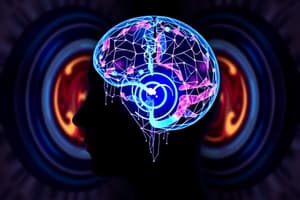Podcast
Questions and Answers
What describes the tendency to attribute internal causes for others' negative behaviors?
What describes the tendency to attribute internal causes for others' negative behaviors?
- Fundamental attribution error (correct)
- Cognitive complexity
- Self-serving bias
- Implicit personality theory
In the context of perception, selection refers to which process?
In the context of perception, selection refers to which process?
- Interpreting stimuli based on personal beliefs
- Organizing information in a meaningful way
- Labeling based on social expectations
- Noticing particular behaviors or words (correct)
Which term refers to the assumptions made about how personality traits are related?
Which term refers to the assumptions made about how personality traits are related?
- Attribution theory
- Self-fulfilling prophecy
- Cognitive bias
- Implicit personality theory (correct)
What does the self-serving bias suggest about how individuals perceive their own behaviors?
What does the self-serving bias suggest about how individuals perceive their own behaviors?
Which factor is considered to affect individual perception?
Which factor is considered to affect individual perception?
What element influences both perception and the language used for labeling?
What element influences both perception and the language used for labeling?
Which type of attribution error involves underestimating internal causes for one's own negative behavior?
Which type of attribution error involves underestimating internal causes for one's own negative behavior?
What does cognitive complexity refer to in the context of perception?
What does cognitive complexity refer to in the context of perception?
What is a significant aspect of the interaction between selection, organization, and interpretation of stimuli?
What is a significant aspect of the interaction between selection, organization, and interpretation of stimuli?
What is a common misconception when attributing others' negative behaviors?
What is a common misconception when attributing others' negative behaviors?
What is the first step in the perception process?
What is the first step in the perception process?
What is meant by the term 'prototypes' in the organization step of perception?
What is meant by the term 'prototypes' in the organization step of perception?
How can personal constructs limit perception?
How can personal constructs limit perception?
What role do stereotypes play in the perception process?
What role do stereotypes play in the perception process?
In the interpretation step of perception, what does 'locus' refer to?
In the interpretation step of perception, what does 'locus' refer to?
What does the 'scripts' concept help us understand in perception?
What does the 'scripts' concept help us understand in perception?
What primarily influences our selection of stimuli in perception?
What primarily influences our selection of stimuli in perception?
Why is it important to have flexible versus rigid stereotypes?
Why is it important to have flexible versus rigid stereotypes?
What is the outcome of using rigid constructs in interpretation?
What is the outcome of using rigid constructs in interpretation?
Which aspect does NOT contribute to how we select stimuli during perception?
Which aspect does NOT contribute to how we select stimuli during perception?
Study Notes
Perception
- Perception is an active process of creating meaning by selecting, organizing, and interpreting people, objects, events, situations, and other phenomena.
- It involves three steps: selection, organization, and interpretation.
Selection
- We give our attention to stimuli that stand out.
- We notice things differently based on new knowledge, skills, or experiences.
- Our selection is influenced by who we are, our needs, and where we are.
- Culture influences what we notice.
Organization
- We organize our experiences by applying schemata, which are mental frameworks that help us understand information.
- Prototypes are ideal examples of categories.
- Personal Constructs are bi-polar dimensions we use to define people and things (e.g., intelligent/unintelligent, attractive/unattractive). They can limit our perception because we fail to notice qualities not covered by our constructs.
- Stereotypes are generalizations about people and situations that allow us to create expected behaviors. They are more helpful when they are flexible rather than rigid.
- Scripts are sequences of behaviors for how we and others should act in particular situations.
Interpretation
- We use attributions to explain behaviors.
- Locus: Is the behavior internally or externally motivated?
- Stability: Is the behavior stable or unstable over time?
- Specificity: Is the behavior global or specific to a certain situation?
- Responsibility: Is the behavior within personal control or beyond personal control?
- Attribution Errors:
- Self-serving bias: Our positive behaviors are described as internally motivated, stable, global, and within our control. However, we attribute negative behaviors to external factors, instability, specificity, and being beyond our control.
- Fundamental attribution error: This error focuses on the negative behaviors of others. We overestimate internal causes for their negative behaviors and underestimate external causes.
- For our own negative behaviors, we overestimate external causes and underestimate internal causes.
Influences on Perception
- Physiology: Our physical state affects perception.
- Expectations: Our prior knowledge and beliefs influence what we perceive.
- Age: Age affects our sensory abilities and our experiences which influence perception.
- Culture and Social Location: Culture, social roles, and social location influence our perception.
- Cognitive Ability: Cognitive complexity influences our perception.
- Self: Unique, individual characteristics influence our perceptions.
- Implicit Personality Theory: Assumptions about how various qualities fit together in personalities.
The Interactive Nature of Perception
- Perception is an ongoing process.
- What we select to perceive influences how we organize and interpret stimuli.
- We must be aware of the labels we use, as language affects perception and vice versa.
Studying That Suits You
Use AI to generate personalized quizzes and flashcards to suit your learning preferences.
Related Documents
Description
This quiz explores the active process of perception, emphasizing its three core steps: selection, organization, and interpretation. Test your knowledge on how culture and personal experiences influence our perception and how we categorize information.




